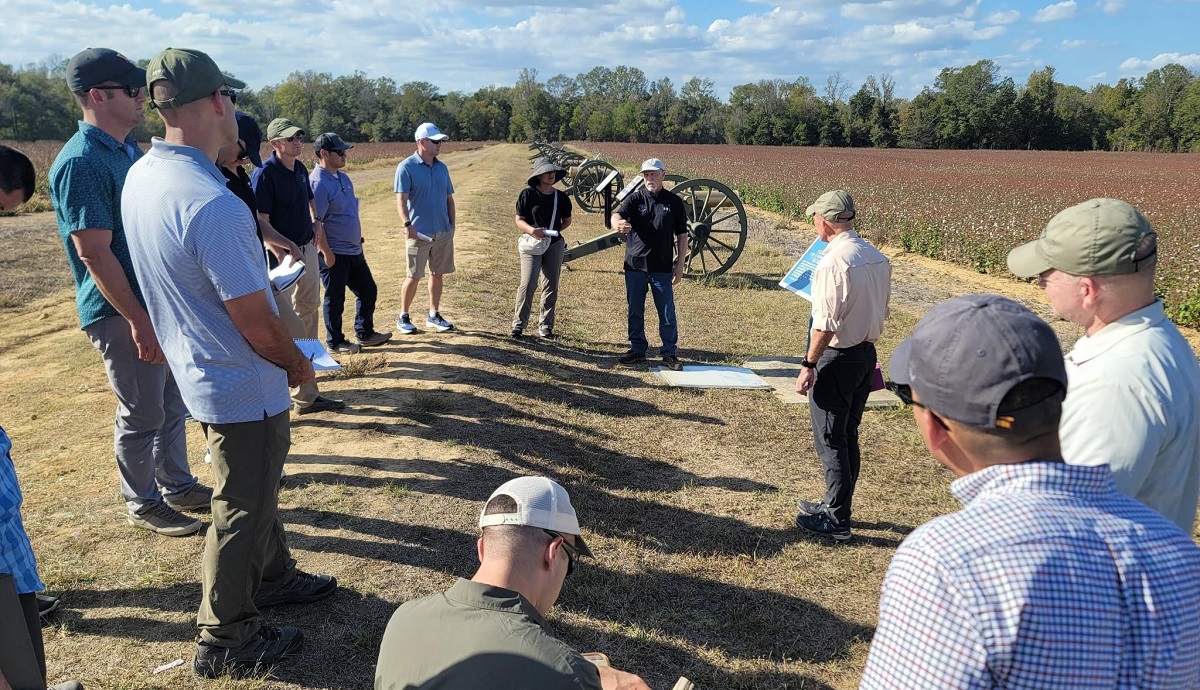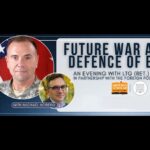
We know that the next few episodes are a little bit of inside baseball. But one of the things we like to do at War Room is highlight the innovative means and methods by which the U.S. Army War College develops strategic leaders. Episodes like this inform incoming resident students of the options available to them during their academic year as well as give insights to listeners who may never get to see the inner workings of senior joint professional military education (JPME). Host Darrell Driver sits down with the directors of three such opportunities: Doug Douds, director of the Advanced Strategic Art Program (ASAP), Richard Lacquement, director of the National Security Policy Program (NSPP) and Celestino Perez, director of the Carlisle Scholars Program (CSP). Their conversation examines the unique opportunities each of these immersive programs affords participants as they continue their growth towards becoming better critical thinkers, trusted advisers and strategic thought leaders in the joint, interagency, intergovernmental, and multinational environment.
For more information on each of the programs you can contact the directors.
Dr. Doug Douds (ASAP) douglas.douds@armywarcollege.edu
Dr. Richard Lacquement (NSPP) richard.lacquement@armywarcollege.edu
Dr. Celestino Perez (CSP) celestino.perez@armywarcollege.edu
We’re looking for people who are willing to suck the marrow out of this year’s opportunity to be here at the Army War College.
Podcast: Download
Douglas Douds is a Professor and Military Historian with the U.S. Army War College’s Advanced Strategic Art Program (ASAP).
Richard Lacquement was the first Dean of the School of Strategic Landpower at the U.S. Army War College. He is currently a Research Professor of the Military Profession in USAWC’s Strategic Studies Institute and is the Director of the National Security Policy Program (NSPP).
Celestino Perez is an Associate Professor at the U.S. Army War College. He serves as the Chair of Executive and Strategic Leadership and as the Director of the Carlisle Scholars Program. Tino teaches policy, strategy, civil and interstate wars, and military ethics. Trained as a political theorist, he has published in Armed Forces and Society, Peace Review, Journal of Military Ethics, and Perspectives on Politics, as well as professional pieces in Joint Force Quarterly, Military Review, Strategy Bridge, and War on the Rocks.
Darrell Driver is Professor in the Department of Military, Strategy, Planning and Operations at the U.S. Army War College.
The views expressed in this presentation are those of the speakers and do not necessarily reflect those of the U.S. Army War College, U.S. Army, or Department of Defense.
Photo Description: The AY24 Advanced Strategic Art Program (ASAP) participates in its opening staff ride following GEN U.S. Grant’s 1863 campaign to seize Vicksburg, open the Mississippi River for the United States, and split the Confederacy.
Photo Credit: U.S. Army photo





Which of the immersive programs, noted and discussed above, would best allow interested U.S. Army War College professors/instructors and attendees to:
a. Explore the suggestion that, for much of the post-Cold War, the U.S./the West saw competition more in economic competition terms:
“Proponents of this vision of a globalized economy characterize the United States as ‘a giant corporation locked in a fierce competitive struggle with other nations for economic survival,’ so that ‘the central task of the federal government’ is ‘to increase the international competitiveness of the American economy.” (See in the only full paragraph on Page 643 of the 2015 Catholic University of America, Columbus School of Law paper entitled “Moral Communities or a Market State: The Supreme Court’s Vision of the Police Power in the Age of Globalization.”)
b. That this such move (for much of the post Cold War, the U.S./the West came to see competition more in economic competition terms) caused the U.S./the West — thus for perceived national security reasons — to prioritize the wants, needs and desires of “market society;” these, over the wants, needs and desires of “community;” this, resulting in resistance and revolts:
“In this new world disorder, the power of identity politics can no longer be denied. Western elites believed that in the twenty-first century, cosmopolitanism and globalism would triumph over atavism and tribal loyalties. They failed to understand the deep roots of identity politics in the human psyche and the necessity for those roots to find political expression in both foreign and domestic policy arenas. And they failed to understand that the very forces of economic and social development that cosmopolitanism and globalization fostered would generate turbulence and eventually resistance, as ‘Gemeinschaft’ (community) fought back against the onrushing ‘Gesellschaft’ (market society), in the classic terms sociologists favored a century ago.” (See the Mar-Apr 2017 edition of “Foreign Affairs,” and, therein, the article by Walter Russell Mead entitled “The Jacksonian Revolt: American Populism and the Liberal Order:”)
c. And that this such action (the U.S./the West, for much of the post-Cold War, prioritizing the wants, needs and desires of “market society” over the wants needs and desires of “community”) allowed that interested and ambitious individuals, groups and/or nations/regimes to take full advantage of this such historic moment; this, to (a) claim that they were the protectors, the defenders of the thus threatened “communities,” to (b) gain rapid and significant power, influence and control via this such approach, and to (c) champion dangerous resistance movements via same?
(Given that, since at least the dawn of modern capitalism in the eighteenth century, nations — for national security reasons — have had to periodically/perennially prioritize the wants, needs and desires of “market society” over “community” and thus — periodically/perennially have had to find a way to deal effectively with those who would significantly resist and/or take advantage of these such moments — given these such matters, then might not one or more of the U.S. Army War College’s “immersed” programs best allow that professors/instructors and attendees could [a] explore the historical record of these such similar times and events and, thereby, [b] perhaps find guidance that would be extremely useful to us today?)
To help us consider just how important it may be for certain U.S. Army War College immersive program professors/instructors and attendees to at least consider taking on the matters that I present above, note that:
a. The so-called “war on terror,” this would seem to fit the post-Cold War “market society” v. “community” frame that I present above? (OBL did, after all, attack the World Trade Center — not once — but twice?)
b. Also the so-called “great power competition” would seem to fit this post-Cold War “market-society” v. “community” frame. (With Putin and Xi now both moving back from “market-society,” and claiming to be the defenders/the protectors of such things as “traditional values” instead?)
c. And likewise even the significant internal conflict within the U.S./the West today; this, also it would seem, fitting the “market-society” v. “community” frame that I present above. (In this case, with the Right and its leadership here in the U.S./the West now gaining significant and rapid power, influence and control; this, by claiming that they are the defenders/the protectors of “community” [v. “market society”] now here at home?)
Thus, given the above, how could the individuals in charge of the U.S. Army War College immersive programs — and/or those wishing to attend same — not find the above to be compelling and not find the above worthy of consideration for incorporation into one or more of their programs???
Another — and final — attempt:
1. At the end of my initial comment above, I suggested that — since at least the dawn of modern capitalism in the eighteenth century — nations, for national security reasons, have had to, periodically/perennially, prioritize the wants, needs and desires of “market society;” these, over the wants, needs and desires of “community,” and, thus, have had to, periodically/perennially, find a way (sometimes “militarily?”) to deal effectively with those who would significantly resist and/or take advantage of these such moments.
2. Sir Michael Howard, it would seem, has suggested that we should study military history in “width;” that is, over a long historical period.
3. Given the long historical period that I address above (to wit: from the dawn of modern capitalism in the eighteenth century up to and including today), which of the U.S. Army War College’s “immersed programs” would best allow interested U.S. Army War College professors/instructors and attendees to (a) study military history over this specific period of time, this, (b) specifically from the perspective that I provide at my item number “1” above and, thereby, (c) possibly provide us with information/guidance which might be extremely useful to us today?
Addendum: For consideration — regarding the matters that I present above:
Robert Gilpin, in the very first page — of the very first chapter (the Introduction chapter) — of his 2000 book “The Challenge of Global Capitalism: The World Economy in the 21st Century” — notes that (a) the “creative destruction” requirements of capitalism (Joseph Schumpeter is referenced here), these, (b) routinely “pose a serious threat to traditional social values, beliefs, and institutions.”
Given that, during the Old Cold War, the communists and communism are likely to have replaced the capitalists; this, as being the ones who posed the most serious threats to traditional social value, beliefs and institutions; given this such suggestion, might we consider the period of the Old Cold War as being unique/as being anomalous? This, given that since at least the dawn of modern capitalism in the eighteenth century — and up to and including today (and thus encompassing the period both before and after the Old Cold War) — it has been the capitalists and capitalism that have posed the most serious threat to traditional social values, beliefs and institutions? (Thus the shift back, post-the Old Cold War, to “resistance forces” focusing on the serious threats posed to traditional social values, beliefs and institutions — not by the communists and communism — but, once again and as before the Old Cold War — by the capitalists and capitalism?)
Note that, once you accept my premise above, that the Old Cold War was an anomalous period (within the long historical period from the 18th Century up to and including today) — one which found that it had become the communists and communism — and thus not the capitalists and capitalism — who most clearly threatened the traditional social values, beliefs and institutions of states and societies of the world;
Note that, once you accept this premise, then it becomes rather easy to answer questions — such as — why, post-the Cold War, has the relationship between population groups and their governments, between population groups and their militaries, between groups and their elites, etc. — why have these such relationships negatively changed post-the Old Cold War.
(In this regard, would it not defy logic — and indeed common sense — to expect that, in circumstances such as I describe above, the relationship between populations and their governments, between populations and their militaries, etc., that these such relationships would not change?)